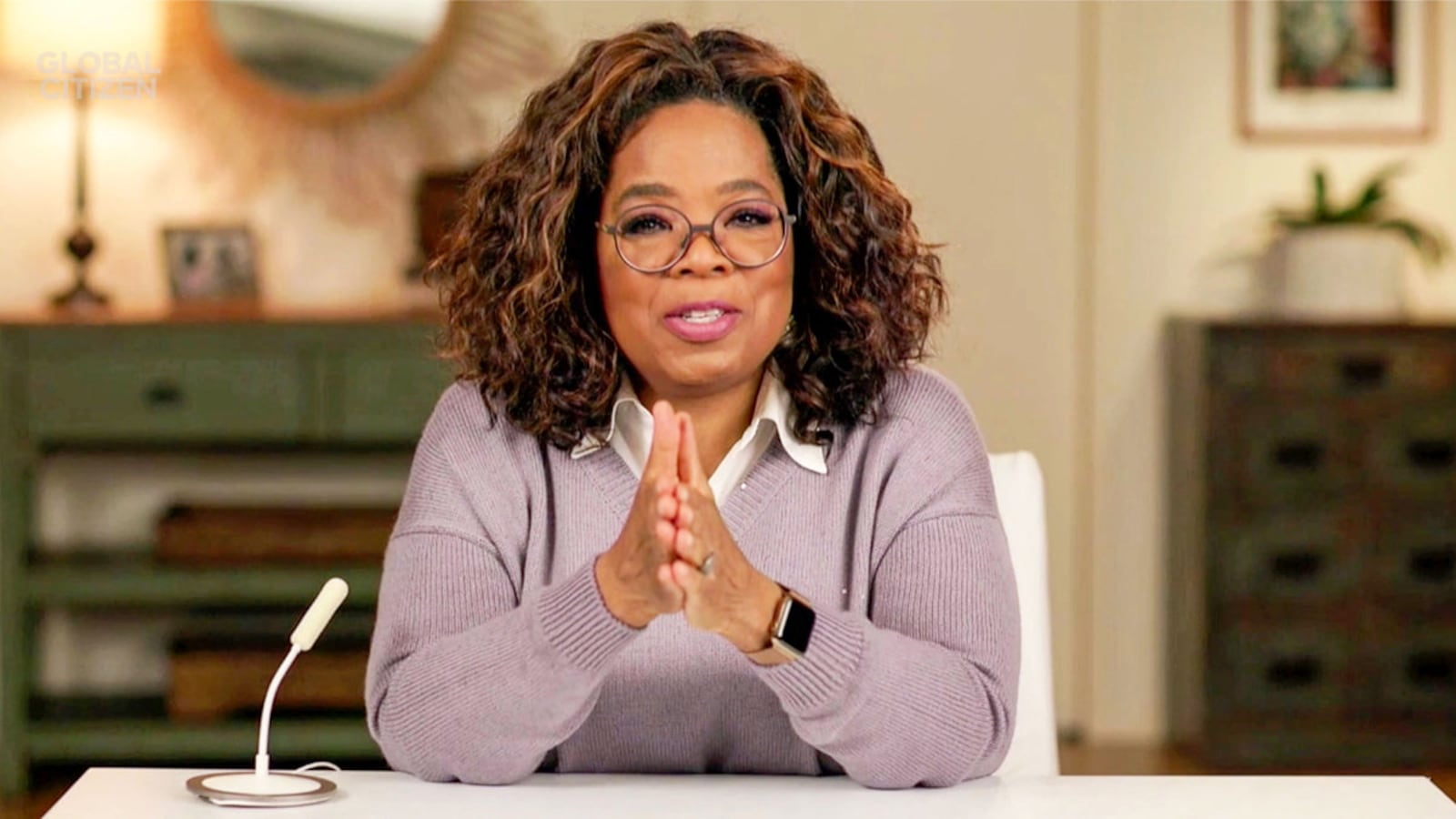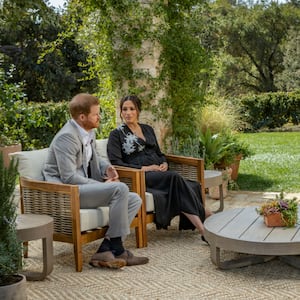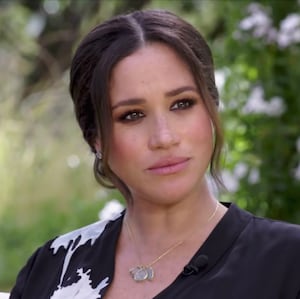Any interview conducted with Meghan Markle and Prince Harry was going to be juicy, especially at this stage of their royal exodus and in the midst of such a treacherous tabloid maelstrom.
But only Oprah Winfrey could have produced what we saw on CBS Sunday night: A generation-defining interview. A global event. Blockbuster television. But, more importantly, actual substance; finally, into the gale of the constantly churning royal rumor mill, the unveiling of actual people and, through them, perseverance and grit. In that regard, consider Winfrey’s interview to be a long-awaited wrecking ball through the palace walls.
Yes, paramount to all of this is the fact that it was a “spilling tea” party of epic proportion, delivered to an audience rabid to sip it all up. To wit, early ratings numbers released Monday morning tally a massive 17.1 million viewers on CBS, a broadcast-TV audience size that is frankly never seen anymore. It even managed to beat Caitlyn Jenner’s interview with Diane Sawyer in 2015, which averaged 16.9 million viewers at a time when such numbers weren’t as rare.
Call it the power of Oprah. Could you imagine any other broadcaster pulling off this kind of interview?
There’s a version where Sunday night’s appearance took place in some puppet-filled bit of sketch comedy or in the backseat of a car tricked out for karaoke, with one of the late-night hosts helping out with image rehab through their usual superficial mania. Or they'd dance out to a chair opposite a daytime TV host and gab innocuously about the need for kindness for 10 minutes, failing to bring the necessary focus to the fortified corruption of the “institution,” as Meghan and Harry kept referring to the royal establishment Sunday night.
It’s hard to even imagine one of network TV’s other respected journalists being capable of surfacing the kind of authenticity that people as famous as Meghan and Harry are conditioned, even trained, to shield.
The combination of Winfrey’s fame and her immediate intimacy is an unrivaled tool in cases like this. She takes advantage of her status as, essentially, one of the most famous people in the world to ask the questions no other person would be comfortable enough to ask, or at least justified in asking. But because she’s Oprah, with her track record behind her and the certainty that she has your best interest in mind, you have no qualms about answering, no matter how vulnerable the response may make you.
Anyone else asking Harry, point blank, if he “blindsided the Queen” would come off as a jackass, for example. Yet Winfrey made it seem like the most natural question in the world—because, for her, it does feel natural that she should get to ask it.
This is her element, the one she has executed flawlessly for decades. In this realm, she is the queen. Just as it had been for so many years when she hosted The Oprah Winfrey Show, it is a thrill to watch her rule.
As Meghan and Harry detonated bombshell after bombshell revelation throughout their sit-down Sunday, social media and friend-and-family group text chains lit up in kind.
On the reports that Meghan had made Kate cry over flower girl dresses, Meghan attests, “Actually, the reverse happened,” a mic-drop the thud of which is still echoing around the world.
After Harry detailed what his relationship with his father had been like “before he stopped taking my calls,” 17.1 million pairs of thumbs got to diligent work transcribing the quote in all-caps shock onto their timelines and text windows: “BEFORE HE STOPPED TAKING MY CALLS?!?!?!” The future king, as callous and savage as the proverbial ex who once ghosted you.
But to focus on the salacious details does a disservice to the depth Winfrey worked so masterfully to uncover. She led a dance, of sorts, with the couple that ensured they gave an interview that mattered, that transcended a war of words played out in tabloids as the palace lobs back their own retaliating accusations.
Harry and Meghan’s story is one that had been romanticized beyond the point of reality. And it has since become so shaded by the hideousness of a press weaponized by its rotting connection to the “institution” that any statement from the ex-royals runs the risk of being reduced to clickbait, misconstrued, or bastardized. You could see Winfrey striving to avoid that inevitability, employing what she is singularly the master at using as a TV interviewer: Her empathy.
She can get emotional without losing her authority. In fact, the emotion is what gives her the authority.
Her interview subjects feel safe sharing their emotions and their truths because of the sense that she is feeling those things alongside you—that she feels for you—and that the catharsis of all that feeling is the priority above whatever ratings or headlines the revelations may help achieve.
When Markle revealed that she had suicidal thoughts while she was pregnant with Archie, Winfrey got visibly upset. She took a beat to apologize to Meghan that she had experienced that; again, she felt for her. And it allowed her to go deeper into that conversation, leading to the discussion about what it takes to admit you need help and the shocking revelation that the “institution” would not allow her to receive it.
Winfrey extended Markle the kindness of emotion—humanity—and it led to what might be the most consequential revelation since Diana’s famous interview decades ago about the royal family and their antiquated, harmful priorities.
Then there’s the Oprah “WHAT!?” of it all.
It was spontaneous, the now .GIF’d and meme’d reaction shot of Winfrey recoiling in disbelief when Markle says that at least one member of the royal family had concerns over how dark the couple’s children’s skin would be. The dramatic reflex merely echoed what we were thinking at home, but, as television, it was monumental. One of the most famous Black women in the world reacting with empathy to another of the most famous Black women in the world, a lightning bolt moment that charged the frank conversation about racism that ensued.
Winfrey didn’t speed through this part of the conversation, returning to it several times, including when Harry came to join them. A good interviewer doesn’t just clock money quotes and headlines as they navigate a conversation, but opportunities to unlock something new about a person by continuing to prod and poke deeper. More, when you disclose something deeply upsetting, you want the person you’re talking to react appropriately—to do the Oprah “WHAT?!”
There was a version of Sunday night’s interview that some skeptics feared, where three famous friends put a megaphone to the couple’s talking points in response to attacks against them. But “she didn’t supply warm bathos or easy platitudes,” as my colleague Tim Teeman wrote in his review of the special. “She interviewed with care and rigor. Every time Meghan or Harry waffled or said something imprecise, she asked them to be precise—especially when it came to identifying the racist or racists within the palace who demeaned Meghan, and who queried how dark Archie’s skin would be when he was born.”
It’s that line of questioning that eventually garnered what appeared to be the most candor from Harry and Meghan about their experience, their frustrations with how the family has treated them, and their horror at the system that they had no recourse but to flee from. This could have stopped as a soundbite. It’s now a TV moment that has the potential to spark a cultural shift.
Even in their refusal to name specifically the family member who raised the skin color question, they said so much more. (“I think that would be very damaging to them...” I screamed.)
High-profile interviews like these are a juggling act of agendas. There’s no questioning that Harry and Meghan had theirs, and they accomplished it as often as they likely irritated their harshest critics, who still find fodder for their attacks on the couple's “privilege” and “ingratitude” in comments made during the interview. And Oprah and CBS had theirs, no doubt. But this was the rare case, I think, where even the teasers for the interview didn’t do justice to the depth and scale of the revelations that ensued.
I loved how sharp a reminder the special was that, when she’s serving these interviews, Winfrey rarely misses. It would take too long to chronicle her history of flawlessness in the genre, from Tom Cruise and Whitney Houston, to the Jackson family and, later, Jackson’s accusers.
She's a maestro, conducting her own symphony of “hmms,” head tilts, and the slightest of nods until she lulls her subject into delivering unfiltered versions of themselves, whether they go there willingly or with defiance. And the consummate TV pro, she knows when to produce her own climaxes and crescendos. Case in point, the towering delivery of this question: “Were you silent, or were you silenced?”
It’s wild to think that Winfrey used to conduct major interviews on the scale of this one several times a year. They came in between countless others that would measure in smaller numbers on the Richter scale but were just as fascinating to watch.
There’s such a difference between the tell-all interview, the kind that this one was, and the damage-control efforts that the genre has morphed into in recent years. What I wouldn’t give for the tell-all to become normalized again—and maybe they will be. The power of Oprah.



